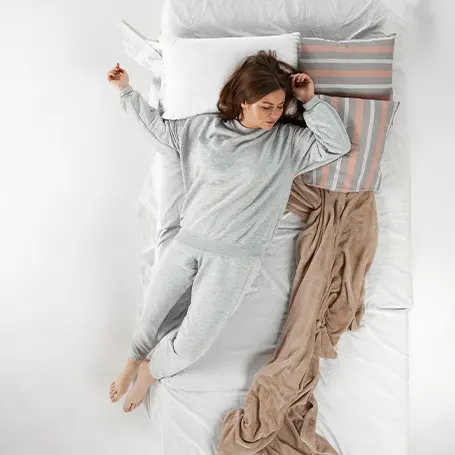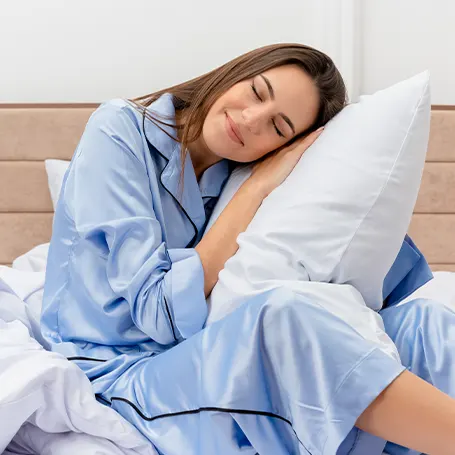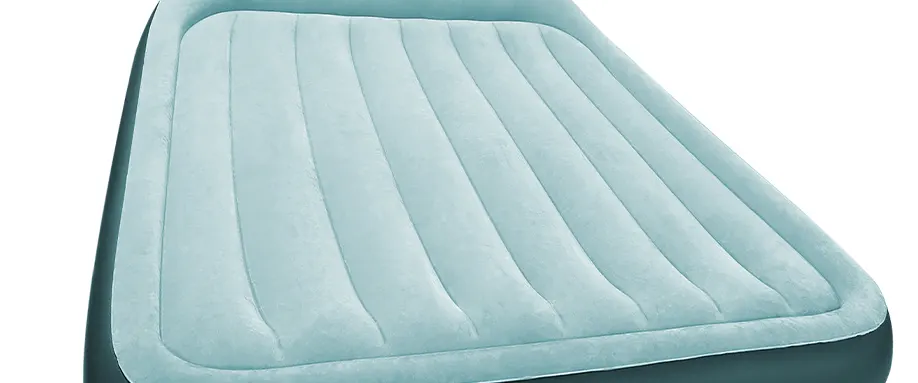Why do people sleep lying down?

Although it's easy to take it as a given, it's rather odd that we sleep lying down. After all, we're at our most vulnerable when on the ground. So, why haven't we gone the route of elephants and evolved to sleep on our feet?
Well, there are a few factors at play. For one, new studies suggest that humans were apex predators for millions of years. So, protecting ourselves wasn't as necessary as it is for prey animals. Secondly, human tribes typically slept in shifts. So, even if something did attack, you had time to get up and run away or attack.
But the most important factor is, of course, our anatomy. When you fall asleep and enter REM sleep, your body actually “disconnects” your muscles. Or, in scientific terms, you lose muscle tone. This is so that you don't start kicking your partner every time you get a nightmare.
And for this same reason, keeping your balance would be quite difficult while standing up and sleeping. After all, unlike elephants, our joints don't lock in and it takes some effort to remain standing. And on top of all that, as you'll soon see, sleeping upright comes with a host of potential problems.
Is sleeping sitting up dangerous?

If you like to travel, or even just have a long commute, you're no stranger to sitting upright and trying to catch a few winks. And while we can all agree that it's not ideal to sleep sitting upright, is it dangerous? Well, yes, it is. Or at least it can be.
While there are some potential downsides, most of them rely on other factors as well. For example, a completely sanitary lifestyle, prior medical conditions, etc. Nevertheless, here are a few of the potential issues you can experience.
However, do note that just because it can happen, it doesn't mean it will happen. So, there's no need to freak out if you've slept upright in the past. But if you do happen to experience any of these issues, make sure you see a doctor.
As you'll see, these are serious issues that don't tend to fix themselves. So, if you do happen to experience any of the following conditions, book a visit to your GP as soon as you can.
Neck and back issues
The most obvious downfall of sleeping in the seated position relates to neck and back issues. After all, your head usually doesn't have proper support and either falls forward or bobs around. Neither of these is ideal as it means a lot of stress is put on the neck during your entire nap time.
And when it comes to you back, a similar principle applies. Typically, getting a good night's sleep in a chair means you will slump forward, keeping your spine in an unhealthy position. With all of this being said, both the neck pain and the spine strain relate to sitting completely upright. Recliner chairs are a different story, which we will discuss later.
Deep vein thrombosis
Deep vein thrombosis is when a blood clot forms in one of the deep veins of the body. And said blood clot usually appears in the leg. As far as symptoms go, you can expect red skin, aches, swelling, and tenderness.
But what does this have to do with upright sleeping? Well, deep vein thrombosis typically occurs when the legs are bent at an angle for long periods of time. Sound familiar? This is also why people who fall asleep sitting down on long flights are typically advised to stretch out their legs every so often.
So, as you can imagine, if you spent an entire night in an upright position, it's less than ideal. With that being said, however, there are factors at play than just sitting still. So, just because you sleep comfortably on your chair from time to time doesn't mean you automatically have this blood clot.
Sleeping while standing up

While we've all nodded off while in a chair, sleeping while standing is an entirely different beast. After all, unlike when you're sleeping while sitting, this requires a lot more balance. However, it can be done.
According to this BBC article, both monks and soldiers have been known to sleep while standing up. However, saying that they got enough sleep is a bit more debatable. After all, once you enter the rapid eye movement (REM) phase, you're likely to topple over.
However, there might still be some hope. According to the Daily Mail, certain Japanese companies have started introducing vertical sleep pods. As the name suggests, workers can take a nap in these pods while standing up, with only a few “arms” keeping them from toppling over.
Are there any benefits to sleeping upright?

So far, it can seem like sleeping upright represents only danger. From developing deep vein thrombosis to neck and back pain, it can seem a bit scary. However, there are a few potential benefits, at least in the short term.
So, while we can't recommend sleeping upright your entire life, napping in a recliner from time to time can be a good thing in the following scenarios.
But we do want to emphasise that we're referring to an inclined position. In other words, you're hardly going to experience these benefits if you sleep on your feet or are completely upright in a chair.
After all, there's a reason why adjustable beds typically only have a 40-50 degree incline. And, as you'll see in the following examples, these benefits mostly relate to how an incline affects your breathing and digestion.
But enough of general talk, let's get into a few of the concrete examples!
Sleep apnea
According to the National Sleep Foundation, sleeping upright can help with sleep apnea to a degree. And seeing how sleep apnea can wake you up, disrupt your sleep cycle, and pose a major inconvenience, this is a big plus.
With that being said, this doesn't cover all forms of sleep apnea. As you can see in the linked article, different people with sleep apnea can react in different ways to different positions. So, be sure to consult your GP.
Certain injuries
For people who are suffering from certain injuries, sleeping in a recliner can allow them to rest comfortably. While in this position, it's a lot harder to roll over and accidentally put pressure on your injured shoulder, for example.
Or if it's a back injury, it can be easier to keep your spine straight due to the same reason. But again, we're specifically talking about recliners, as sitting in a chair would have the opposite effect.
Other conditions
Besides just sleep apnea and certain injuries, sleeping in a recliner can slightly help with a few other conditions as well. For example, if you have issues with congestion, acid reflux, or similar conditions.
These conditions would technically benefit from sleeping in a chair (or even standing up) as well. However, the downsides that come with that are probably worse than the positives. So, we'd suggest sticking to a recliner or slightly elevating your head with a pillow instead.
Should you sleep in a recliner?
As you might have noticed, quite a few of the benefits we've mentioned come with the caveat of “if you're sleeping in a recliner”. And that's because it takes the best parts of both sleeping upright and sleeping in your bed.
Your spine is straight and your head is secure but it's also harder to roll over and gravity is on your side. And according to Harvard, there are no major risks involved as long as you can kick your feet up or occasionally stretch. But you should probably sleep in a bed anyway.
Conclusion
Overall, is sleeping upright possible? Yes. Should you do it? Only if it's a recliner and there's a specific need for you to do so. And even then, don't spend every night in this position. There's a reason we evolved the way we did, and sleeping upright just isn't in the cards for us.















There are no comments yet
"*" indicates required fields